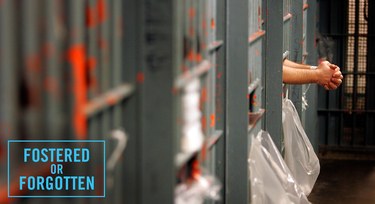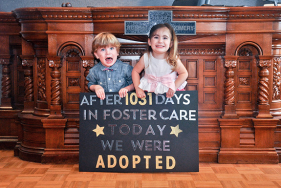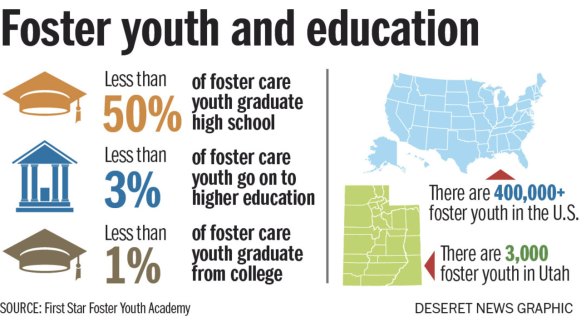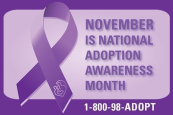Lisa Kelly is a law professor and former Associate Dean of University of Washington School of Law. She is the Director of Children and Youth Advocacy Clinic in Seattle, where she teaches courses on Family Law and Child Advocacy. Kelly is the chairwoman of Washington’s Statewide Children’s Representation Workgroup, where has led the effort to establish standards of legal representation for children and youth who have been removed from their homes by the state.
Kelly is the author of numerous articles and books on foster care and adoption. Her most recent book is Representing Youth: Telling Stories, Imaging Change. She has a BA in Writing from University of Pittsburgh and a JD from University of Pennsylvania Law School.
 Image courtesy University of Washington School of Law
Image courtesy University of Washington School of Law
Interview of November 24, 2018
Alexandra Wang: What inspired you to specialize in foster care and adoption law?
Lisa Kelly: I was encouraged to go into law because I was interested in social justice. I initially focused on domestic violence, social security income (SSI), poverty, civil rights and prison reform. I found that the prison system was (and remains) tied to foster care, when I worked with many incarcerated men. The foster care system can be a pipeline to prison. Some children move through foster care successfully, but there are many former foster youth in prisons. In West Virginia, I became a facilitator in a program that offered training sessions on child welfare. Here, I encountered many children who needed legal help. I decided to go into legal rights for foster children.
 Image courtesy Teen Vogue
Image courtesy Teen Vogue
Alexandra Wang: What is the most common reason for placing children in foster care?
Lisa Kelly: Child Protective Services (CPS) has reported that removal from families is usually due to child neglect, rather than child abuse. Child neglect is the result of parents failing to provide for the basic needs of their children. It often occurs because the parents are struggling with substance abuse or mental illness. In contrast, child abuse involves physical, sexual or psychological assault of the child. Neglect is involved in roughly 70% of substantiated cases, whereas child abuse comprises the remainder. Of course, these statistics are complicated by the fact that upon further investigation, there could be multiple types of maltreatment, even though the initiating complaint may be for abuse or neglect alone.
Alexandra Wang: What are the child’s rights once she or he is placed in foster care?
Lisa Kelly: Federal law requires that all children in foster care have the right to at least a Guardian Ad Litem (GAL), who will advocate for what seems to be the child’s best interests. The GAL may or may not be a lawyer. All states must provide at least a GAL in every case. However, states vary as to their practices. Within my State of Washington, practices vary from county to county as to whether the child will receive a lawyer or, instead, will receive a volunteer non-lawyer who serves as the child GAL. In King County, where I practice and where Seattle is located, children 12 years of age and older are appointed lawyers who will represent what the child wants. Children who are younger than 12 years of age have volunteers who represent their best interests.
Alexandra Wang: Why are older children represented by lawyers while younger children have volunteers?
Lisa Kelly: The underlying policy in King County appears to be that children who are 12 years of age and older are mature enough to state their interests to a lawyer. Lawyers thus represent their stated interests. The age at which a child can express his or her interests is not definitively established or agreed upon by legal or developmental psychology experts.
Even in Washington, two counties appoint attorneys for children who are 8 years old and older. Washington also has a statute that mandates appointment of attorneys for a certain subgroup of children within foster care without respect to their age, which has resulted in children as young as two having lawyers appointed for them. Attorneys for these very young children are supposed to represent their legal interests, which means that these attorneys study the law and advocate for the rights that apply to the child in whatever stage of the case that is ongoing. Meanwhile, the comments to the Rules of Professional Conduct which govern lawyers say that children as young as five or six may have the ability to express a preference. So, as you can see, there is a hodgepodge of reasoning, sometimes contradictory, that underlies when and why a child should have an attorney and what that attorney’s role should be.
The important thing to understand is that there are essentially three models of advocacy, and every child in every case should have an advocate who is engaged in one of these models of advocacy: best interests, in which, the advocate is charged with investigating the situation and providing the court with his or her opinion as to what is best for the child, stated interests, in which, the attorney is charged with explaining the situation to the child, helping them to understand what the possible outcomes are, finding out what the child wants from among those outcomes, and then using the law to advocate for what the child wants; and legal interests, which is used for children who cannot express a preference and which requires the attorney consider the child’s rights at every stage of the proceedings and then advocate to protect those rights.
 Image courtesy Adoption.org
Image courtesy Adoption.org
Alexandra Wang: Are volunteers representing best interests as effective for children as lawyers advocating for stated interests?
Lisa Kelly: Volunteers do not have legal backgrounds and so they cannot advocate for a child’s legal rights; they typically have 40 hours of training on child abuse and neglect. The major criticism of volunteers representing the best interests of young children is that the demographics of volunteers is very different from that of the families come into contact with the child welfare system. Families in the child welfare system typically fall well below the poverty line and are disproportionately those of color. Meanwhile, the demographics for volunteers draws largely upon a group of people who have both the financial security and time to volunteer—namely white, upper or middle class, often retirees, usually women. Many feel that these volunteers aren’t familiar with family situations different from their own, and that this unfamiliarity will lead to bias in advocating for a certain view of a child’s best interests. On the other hand, those who support the use of volunteers point out that lawyers often do not have the time that is necessary to understand the whole picture because they often have large caseloads.
Right now, there is a movement in Washington to expand the right to counsel for all children in foster care, regardless of their age. This movement does not call for the abolition of volunteer GALs, particularly, for younger children. Some believe that a child deserves to have both.
Alexandra Wang: Can foster children refuse to be put in foster care?
Lisa Kelly: Foster children cannot refuse to be placed in foster care. They cannot choose their foster family. However, in Washington, they do have the right to be safe in their foster homes. They also have other rights, including the right not to be forced to practice a particular religion.
 Image courtesy AdoptUSKids
Image courtesy AdoptUSKids
Alexandra Wang: Children and their siblings are often separated, after they are placed in foster care. What are their rights if they want to see each other?
Lisa Kelly: Children and their siblings are separated in foster care, most often, because there is a shortage of foster families and, often, there is not enough room in a foster home to take a sibling group. In Washington, they do have the legal right to see each other, but that doesn’t always happen. Sometimes, siblings are even sent to different states. This happens because there simply aren’t enough in-state placements. Basically, there is a lack of resources in the foster care system.
 Image courtesy Campus Safety Magazine
Image courtesy Campus Safety Magazine
Alexandra Wang: How do these challenges affect foster children’s relationship with their peers, foster parents, social workers, law enforcers, and teachers?
Lisa Kelly: Foster children often feel they don’t belong because they have to switch families or facilities. Some feel they don’t have family or friends. They feel that their experiences make them too different from their peers. Many foster children have terrible experiences with foster families or facilities. This affects trust, making it very difficult for them to form strong relationships. Many of them say they are their own advocates.
Alexandra Wang: How does being put in foster care affect children’s education?
Lisa Kelly: Foster children often have to transfer schools many times, sometimes transferring several times during the school year. This happens when they are sent to foster families in different school districts or even different states. These students often find that their school credits aren’t transferable. I have seen some high school seniors with only two credits because they transferred schools so many times. This results in a delayed graduation or dropping out of school.
 Image courtesy New York Foundling
Image courtesy New York Foundling
Alexandra Wang: What can be done to help these students?
Lisa Kelly: In addition to lawyers or volunteers, foster children in Washington should be assigned an educational advocate. An educational advocate can be a foster parent, a volunteer, or anyone approved by the court. Just like parents, educational advocates can have access to the foster child’s educational records or visit the foster child’s school.
Alexandra Wang: What are other academic challenges faced by foster children?
Lisa Kelly: When a child transfers schools as frequently as children in foster care do, agencies and schools lose or don’t receive the foster child’s records. Nobody knows what has or has not been done yet. This is sadly true when it comes to things as simple as vaccinations and as complex as identification for special education. As a result, everything gets done over again or sometimes not done at all. Children may be mis-diagnosed with ADHD when the real issue is PTSD or adjustment disorder caused by removal and move from place to place.
Alexandra Wang: Many foster children have disabilities. How are they affected?
Lisa Kelly: Children may be medicated before or after they are placed in foster care. Since their records often are misplaced, they are diagnosed and medicated several times. This affects their physical, cognitive, and emotional well-being. Agencies and schools must be more organized and stay in touch with each other.

Image courtesy First Star Foster Youth Academy
Alexandra Wang: Are there any school activities that are especially challenging for foster children?
Lisa Kelly: Any events or holidays that involve parents are tough for these children. Teachers might have students make cards on Mother’s Day or Father’s Day. This makes foster children feel out of place, because many of them feel distant from or don’t even know their parents. Schools should be sensitive to foster children on these occasions. For example, teachers might say: “Make a card for your mother, father, or anyone who is special to you.”
Alexandra Wang: What can be done to protect children in group homes or institutions from abuse?
Lisa Kelly: Children who are placed in group homes or institutions have the right to report abuse or neglect, but it is really hard. Group homes and institutions have many resources with which to protect themselves. There is always a danger that reporting abuse or neglect will escalate the situation. Children won’t have many options if they are removed from the group home or institution. They often are stuck in a group home or institution because there aren’t many places for them. Often the new group home or institution isn’t any better.
Alexandra Wang: There are reports that some states are accused of placing foster children in group homes and institutions run like a prison. Can you comment on it?
Lisa Kelly: Many for-profit group homes are run by a company called Sequel. The Clarinda Academy is an example of one such institution. They receive $9,000 to $12,000 a month from Washington State for each foster child sent over to them. An independent investigation by Disability Rights Washington found that social workers had not done thorough investigations of the Clarinda Academy. This report made clear the difficulties that foster children have in reporting problems at these institutions.
 Image courtesy The Tama-Herald The Toledo Chronicle
Image courtesy The Tama-Herald The Toledo Chronicle
Alexandra Wang: It has been reported in the State of Washington that there are very few resources and options for foster children. What happens when they can’t be placed in a foster family or facility?
Lisa Kelly: These children are forced to stay in a hotel or a social worker’s office for an extended period of time. They are supposed to be accompanied by two social workers during the evenings and spend days in the office. Older children may spend the night in a hotel room on their own, but with social workers in a neighboring suite.
These are not luxury hotels. I would not recommend having foster children stay in offices or hotels. Period.


Image courtesy Texas Tribune Image courtesy Investigate West
Alexandra Wang: What are some of the consequences of placing a child with a hostile foster family, facility, office, or hotel?
Lisa Kelly: Foster children often run away in an attempt to find their parents, siblings, other relatives, or trusted adults. Some attempt to live on their own. Unfortunately, they are quickly found by dangerous people. Sex trafficking is a particular problem for the youth who run. Shelter workers told me that young people, particularly girls, who run away are often approached by pimps within three hours of finding themselves on the street.
Sex traffickers wait for runaways near bus stops and train stations. They lure runaways into relationships with them by pretending to be supportive.
Alexandra Wang: What happens to runaway foster children when picked up by the police?
Lisa Kelly: In Washington, they will be sent to juvenile detention. Typically, they are brought before a judge who says they will have to stay in detention until they do something to show they have learned their lesson. The judge will require them to write an essay about the dangers of running away or why they ran away. Sometimes, they will also be assigned to read something and write about what they read. If they don’t do this, they will have to stay in detention for seven days.
 Image courtesy rpmarchildon
Image courtesy rpmarchildon
Alexandra Wang: What are the consequences of failing to write these essays? Is this effective at preventing future attempts by the child to run away?
Lisa Kelly: Illiterate foster children may not tell the judge that they are illiterate, because they are embarrassed and scared. So they stay in detention instead of facing the humiliation. This is the same for foster children with disabilities or, for whom, English is a second language. It is critical that these young people have lawyers to represent them. Lawyers can explain the situation to them and ask about their abilities without making them feel ashamed. Unfortunately, in my experience, even when the child has a lawyer, the lawyer may not be given notice of the hearing in sufficient time to speak with the child beforehand. This is another issue in Washington that we hope to change. Children who run away have likely experienced a series of traumas in their life. Placing them in detention will only compound that trauma.
Alexandra Wang: Is there any group or type of children who are especially likely to encounter hostility or abuse in foster homes or institutions?
Lisa Kelly: Foster children with disabilities are especially prone to abuse and neglect. Since they have mental illnesses and behavioral challenges, they are often placed in an overly restrictive environment.
Foster children who are members of the LGBTQ+ Community often face discrimination in their foster homes, group homes, or institutions. They are forced to follow gender-conforming rules. Many of them are placed with very religious families who tell them that they are going to hell because of their sexual orientation or gender identity. They feel it is too risky to report the violation of their rights since there are too few places will take them.
Alexandra Wang: Do religious foster children face similar challenges?
Lisa Kelly: Foster children have the right to go to their place of worship. However, there is very little that can be done for them if they don’t have a trusted adult to take them, unless they have an attorney who can advocate for them. Non-religious foster parents are not always aware or accommodating of their foster child’s religion. Again, foster children can report these problems to their social worker, but with the shortage of foster homes, it is challenging even for the most sympathetic social worker to find a more culturally appropriate home. Foster children who want to go to church or other religious institutions are dependent on their foster parents to take them. I am also aware of cases of foster children being pressured to go to their foster parents’ place of worship, or to eat food that they are not permitted to eat according to their religious belief.
Alexandra Wang: How can foster parents adopt the foster child?
Lisa Kelly: The biological parents either have to agree to the adoption, or their rights have to be terminated by the court. Parents have approximately a year and a half to correct the problems that led to having their children removed from their care. If they fail to do so, the court will order the state begin to take legal action to terminate their rights, unless certain exceptional circumstances exist. This timeline places many parents, who are experiencing addiction or mental illness, at risk of losing their parental rights, because successful treatment of both of these issues often takes longer than a year and a half, and the full range of treatment resources are often unavailable.
Under federal law, social workers are not allowed to make placement or adoption decisions based on race.
 Image courtesy CBS News
Image courtesy CBS News
Alexandra Wang: In other interviews, you have talked about the need to offer services to foster children and homeless youth. Can you give some examples of these services?
Lisa Kelly: Youth-led effort provides opportunities for young people to learn self-advocacy and empowerment with peers who understand their lived experiences. They are designed to be fun, strength-based and youth affirming.
I have worked closely with groups in my state, such as The Mockingbird Society. These current and former foster youth and homeless youth assist me in teaching my students the skills they will need to be effective advocates. The University of Washington is also collaborating on new effort designed to provide services that look attractive and fun! The Doorway Project is tied to University of Washington, especially, with the School of Law and the School of Nursing. Student volunteers provide most of the services.
The Doorway Project provides a cafe like space, in which, art, music and entertainment exist in the same building as health, legal and other services designed for young people in need. For now, we are testing this concept at Pop-Up cafes, in which, a food truck and booths providing services along with entertainment and art. Homeless youth can get daily necessities, such as food, water, clothes, and foot care, without revealing their situation. Everyone is welcome.


Image courtesy The Doorway Image courtesy University of Washington
Alexandra Wang: What is your advice to foster parents, guidance counselors and others so that they can advocate most effectively on behalf of foster children?
Lisa Kelly: Like all children, foster children need trustworthy adults who value their strengths and are able to help them. Resilience studies have shown that one of the most powerful protective factors in a child’s life is having at least one adult whom they trust to recognize and value them.
Alexandra Wang: What steps can be taken to gain their trust?
Lisa Kelly: Be a good and curious listener; don’t villainize their parents. Ask them what they need. Don’t make false promises; be clear about what you can and cannot do.
Follow up on their situation. Be reachable. Understand that trust may come slowly. Their trust has been broken many times by both adults and institutions, sometimes, including their own parents and well-meaning people like you who have sincerely tried to help but have over-promised or given up. Take any concerns seriously. Following these steps would greatly help improve their situation.


Image courtesy fosteryouthcaucus Image courtesy Friends in Adoption
Copyright by Alexandra Wang, 2019. All rights reserved.
![]()